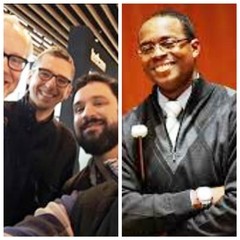|
Back
Ottoman Marches and Lang Twig-onometry New York
David Geffen Hall, Lincoln Center
08/01/2017 - & August 2, 2017
Wolfgang Amadeus Mozart: Overture to Die Entführung aus dem Serail, K. 384 – Symphony No. 31 in D Major (“Paris”), K. 300a [297]
David Lang: man made (New York Premiere)
Jean-Baptiste Lully: Selections from Le Bourgeois gentilhomme
Sō Percussion: Eric Cha-Beach, Josh Quillen, Adam Sliwinski, Jason Treuting
Mostly Mozart Festival Orchestra, Louis Langrée (Conductor)

L. Langrée/D. Lang (© Cincinnati Orchestra/SCPR.Org)
...he heard/A rumbling, west of Mexico, it seemed,/Approaching like a gasconade of drums.”
Wallace Stevens, from The Comedian as the Letter C
With Sō Percussion, Wallace Stevens had it wrong. There is nothing of the blustering gasconade or the stomping Stomp or the percussion battery battering-ram assault of assault-and-battery. The four members of Sō Percussion are the Emerson String Quartet of percussion. Last night, in David Lang’s man made, they broke twigs or tapped on garbage cans or tinkled wine bottles with the elegance of the Emerson playing a Mozart adagio. And when rage was heard in man made, it came from the orchestra.
But first, an apology. Last week, I wrote that the Mostly Mozart Festival Orchestra sounded dull, correct, appropriate, without resonance. I realize now that this was due to a correct, appropriate guest conductor who perhaps didn’t understand that a pickup orchestra–even one whose musicians came from sterling local orchestras–needed that extra oomph to make their voices ring.
Louis Langrée, who has been conducting this orchestra each summer virtually from its inception, does understand that. Next to the reserved movements of last week’s British conductor, his movements might seem exaggerated, swaggering. But the results he got last night were astonishing.
And percussive. From beginning to end.
The beginning was Mozart’s rarely played Abduction from the Harem, which–like so much 18th Century music, including that paragon of profundity, Beethoven’s Ninth–used the Ottoman bands as comedic foils. Mozart did the same thing here, with cymbals and bells clashing, with the timpani of Jaudon Gilliam hammering, and with martial burlesque which would have made Rossini jealous.
For the audience in this concert of rarely played music, it was a treat. For the Mostly Mozart Festival Orchestra, is was like a Marine Corps morning exercise to get them in shape for battle. Though for David Lang’s de facto concerto for Sō Percussion, this was less a battle than an opportunity to produce scintillating sounds, with an orchestra to match.
One can never predict Mr. Lang’s compositions. He once confessed to equally loving the potential of words and music, so most of his works have had the vocal element. In man made, Sō Percussion’s work was vocal indeed, though hardly in the category of “speaking drums.”

Three members of Sō Percussion/J. Gilliam (© Courtesy of the Artists)
Rather, in the 22-minute single-movement work, we had diverse voices from the quartet, followed by an orchestral...er...variation, or augmentation or even mutation.
Twenty-two minutes sounds massive, but this was divided into accessible segments, beginning with a bit of lightly amplified “twig-onometry”. I.e. each of the four would break a twig (there were dozens on their stands), letting the broken pieces fall to the floor (a mezzoforte “plunk”). The orchestra gradually moved in but not until a variation on, what sounded like, Chinese gongs in the background.
After this, Sō Percussion played a tinkly little tune on mini-xylophones, followed by the most interesting orchestral music. First, the Mostly Mozart Festival Orchestra timpanist Jaudon Gilliam let go with mighty THWACKS on his drums, the brass consort smoothed their way up and down the scale, and the strings attacked with quarter-tone (or perhaps minor-second) melodies. What had been pleasant enough music previously was now uncomfortable, disconcerting, like drops of hydrochloric acid in the ice cream.
Following this were more marimba sounds, along with wine-bottle-tappings, banging-on-a-trash can, and finally a variation of a Bach Well-Tempered Clavier Prelude (I think the 13th from Book I). The Baroque melody and counterpoint were Baroque-end up by some percussive snapping, by the orchestra, and finally–most abruptly–coming to an end on a dominant note.
Leaving us hanging! And breathlessly alive. For this was Lang at his most inventive and most gorgeous and deceivingly simple. The combination of Lang and Sō Percussion and conductor Langrée at his most energetic was joy, untarnished joy.
Sō Percussion wasn’t finished. The Lully music from Le Bourgeois gentilhomme is frequently played with the Richard Strauss orchestration. Here, the original was used, with a few caveats. Except for a large lute, the instruments were hardly ancient. And Sō Percussion added their own military might to the first movements, marching to the front with a final March for a Turkish Ceremony using various castanets and a large silver staff decorated with a few dozen bells.
(Was this the type of staff which accidentally pounded Lully’s foot, leading to the fatal gangrene?)
The last work was another rare Mozart piece, the “Paris” Symphony, written for an audience about which Mozart had mainly contempt. Thus, he gave them what they wanted. A big big opening for the whole orchestra, including, for the first time, clarinets, as well as horns, trumpets and timpani. Then a pleasant Andante, followed by a finale for which Mr. Langrée allowed his orchestra to reach for the top. Tricky counterpoint (that mid-section fugato was like a gift he dropped in for the hell of it), layer upon layer of sounds, and a grand finale.
The Mostly Mozart Festival Orchestra was ready to let themselves go blazing, but Mr. Langrée roped them in, so that the stentorian sounds for the Parisian plebs became more subtle for an entranced New York audience.
Harry Rolnick
|